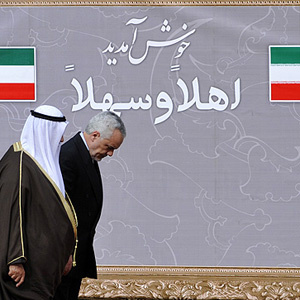Iran and Kuwait, Great Potentials for Better Relations
Economic cooperation can be the initial point for brighter days in Tehran-Kuwait relations

On Saturday 21st of November, Kuwaiti Prime Minister Nassir al-Muhammad al-Ahmad al-Sabah made a first-time visit to Iran in what was considered by many political observers a leap in Iran-Kuwait bilateral ties. Recent developments of Middle East and Iran-Arab World affairs had added to the significance of Nassir al-Sabah’s visit to Iran. A similar visit to Iran was made by the Emir of Qatar two weeks earlier. Frequent diplomatic meetings between Iranian and Arab diplomats during the recent months have attracted the attention of political observers and the media.
The delegation accompanying the Kuwaiti prime minister included petroleum, trade, finance and foreign Affairs ministers, initially signaling the economic dimension of the trip. However, the Kuwaiti PM’s visit with Supreme Leader Ayatollah Khamenei, President Mahmoud Ahmadinejad and some other high-ranking Iranian officials showed that there was more to the visit than talks on money and trade. Meetings at that level had been never held between Iranian and Kuwaiti officials.
Interestingly, Iran and Kuwait have many commonalities to initiate a closer partnership. Economy, most important than all gas and water export, seem to be the best starting point. However, the level of meetings shows that political issues have overridden economy. Regional issues, diplomatic and security developments have no doubt been the main topic of negotiations, but Iran-Arab affairs have also been certainly discussed.
Observers believe that there is a direct connection between Iran-Saudi Arabia tensions, Iran’s nuclear program, Tehran-Washington struggle, regional developments such as the al-Houthi uprising in northern Yemen, Lebanon’s domestic politics, Palestinians situation and increasing diplomatic exchanges between Iran and Arab states. Some also claim that speculating Saudis’ regional influence going downhill, Kuwait, Qatar and other GCC members are trying to approach Saudi Arabia’s regional rival, Iran. Recent visits are testament to this goal.
The different approach of Iran and Arab states towards regional and global developments has always brought challenge to their ties. Arabs’ wariness with Iran’s nuclear program and a likely Tehran-Washington reconciliation, plus their suspicion towards Iran’s regional influence, has always created problems.
As an Arab state, a GCC member and a close regional ally of the United States, Kuwait’s relations with Iran are affected by these circumstances. However, Nassir al-Sabah’s visit to Iran brings hopes that there is still an opportunity for Iran to improve ties with regional states.
Iran and Kuwait have a 10-year dispute over demarcation of marine borders, borders which determine which country receives the better share of the lucrative Arash/ Durra gas field. a few months ago, Kuwait’s territorial claims over Iran’s waters located in northern part of the Persian Gulf, where Arash gas field and Soroush oil field lie, added to the differences. However, it seems that despite the priority of political issues in Nassir al-Sabah’s talks with Iranian officials, the economic ties between Iran and Kuwait, particularly Iran’s water and gas export to this Arab country can act as a springboard towards further cooperation and removal of mutual suspicions.
The delegation accompanying the Kuwaiti prime minister included petroleum, trade, finance and foreign Affairs ministers, initially signaling the economic dimension of the trip. However, the Kuwaiti PM’s visit with Supreme Leader Ayatollah Khamenei, President Mahmoud Ahmadinejad and some other high-ranking Iranian officials showed that there was more to the visit than talks on money and trade. Meetings at that level had been never held between Iranian and Kuwaiti officials.
Interestingly, Iran and Kuwait have many commonalities to initiate a closer partnership. Economy, most important than all gas and water export, seem to be the best starting point. However, the level of meetings shows that political issues have overridden economy. Regional issues, diplomatic and security developments have no doubt been the main topic of negotiations, but Iran-Arab affairs have also been certainly discussed.
Observers believe that there is a direct connection between Iran-Saudi Arabia tensions, Iran’s nuclear program, Tehran-Washington struggle, regional developments such as the al-Houthi uprising in northern Yemen, Lebanon’s domestic politics, Palestinians situation and increasing diplomatic exchanges between Iran and Arab states. Some also claim that speculating Saudis’ regional influence going downhill, Kuwait, Qatar and other GCC members are trying to approach Saudi Arabia’s regional rival, Iran. Recent visits are testament to this goal.
The different approach of Iran and Arab states towards regional and global developments has always brought challenge to their ties. Arabs’ wariness with Iran’s nuclear program and a likely Tehran-Washington reconciliation, plus their suspicion towards Iran’s regional influence, has always created problems.
As an Arab state, a GCC member and a close regional ally of the United States, Kuwait’s relations with Iran are affected by these circumstances. However, Nassir al-Sabah’s visit to Iran brings hopes that there is still an opportunity for Iran to improve ties with regional states.
Iran and Kuwait have a 10-year dispute over demarcation of marine borders, borders which determine which country receives the better share of the lucrative Arash/ Durra gas field. a few months ago, Kuwait’s territorial claims over Iran’s waters located in northern part of the Persian Gulf, where Arash gas field and Soroush oil field lie, added to the differences. However, it seems that despite the priority of political issues in Nassir al-Sabah’s talks with Iranian officials, the economic ties between Iran and Kuwait, particularly Iran’s water and gas export to this Arab country can act as a springboard towards further cooperation and removal of mutual suspicions.

